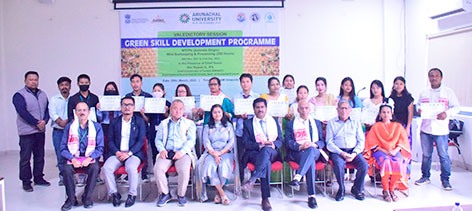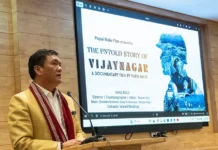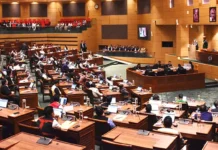NAMSAI, 29 Mar: Chief Conservator of Forests (CCF) Rajesh S Kumar said that Arunachal Pradesh, being an agrarian society, can greatly benefit from the wild beekeeping trade as it has the potential to offer high economic returns.
Attending the valedictory function of a training programme on ‘Wild beekeeping and processing’ here on Tuesday, Kumar emphasised the need for improving the economic resilience of different communities in the region. He said that the economic standards of the local people can be greatly improved by such sustainable livelihood initiatives, while also conserving natural resources.
Arunachal University of Studies (AUS) vice chancellor Dr B Mohan Kumar said that “up to 30 percent increase in the productivity of field crops can be achieved by bee-supported pollination.”
“Farmers have boosted their incomes from beekeeping in many places, including in the Brahmaputra river basin. Yet, pollinators in most parts of the world are under immense threat owing to anthropogenic factors, which cause pollination deficits,” the VC said, adding that the deficit can only be controlled by “enhancing efforts in beekeeping on a large scale.”
Environment Director D Dohu Robin encouraged active participation of youths in the green skill development programme. “After certification, the trainees can become trainers in their respective communities and promote beekeeping in a much more impactful manner,” Robin said.
“Such green skill development programmes will be further encouraged by the government for the betterment of the local community and the growth of the agricultural sector,” he said.
Kamlang Tiger Reserve Deputy Conservator of Forests Chestha Singh expressed happiness over the various skill-based training programmes being conducted at the AUS for the local youths.
“Such training would help local youths in improving the natural ecosystems by creating awareness regarding apiculture and becoming future entrepreneurs,” she said.
AUS science & technology director Dr Rani Jha highlighted the efforts of the university in linking classroom education with practical skill-based training programmes.
Dr Jha said that use of local resources in creating sustainable job opportunities, especially in Arunachal, is one of the prime focus areas.
The trainees were encouraged to utilise the knowledge gained during the training programme to become entrepreneurs.
About 15 trainees aged 18-25 years took part in the programme.
Sponsored by the Arunachal ENVIS Hub, the training programme was organised by the AUS in collaboration with the environment, forests & climate change department.





